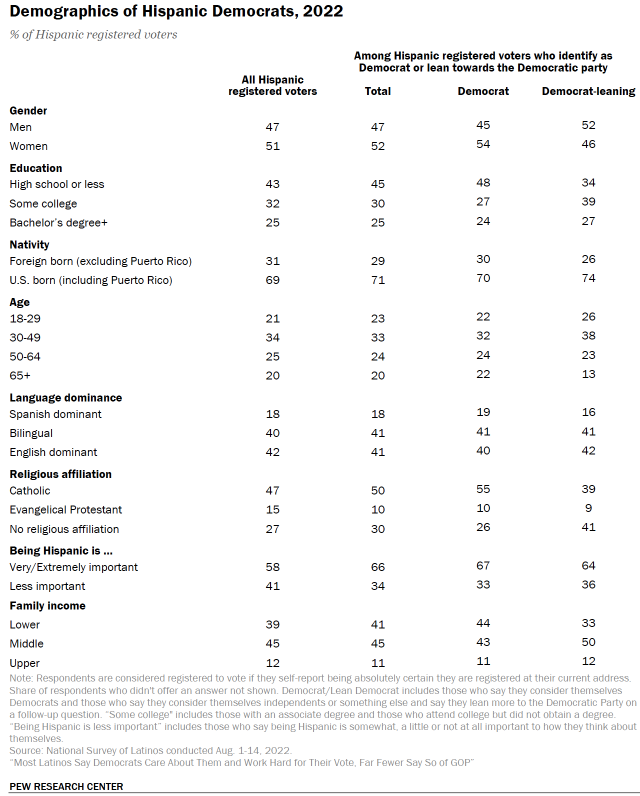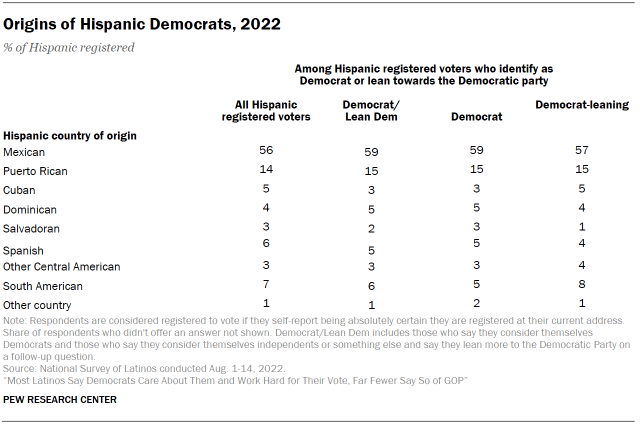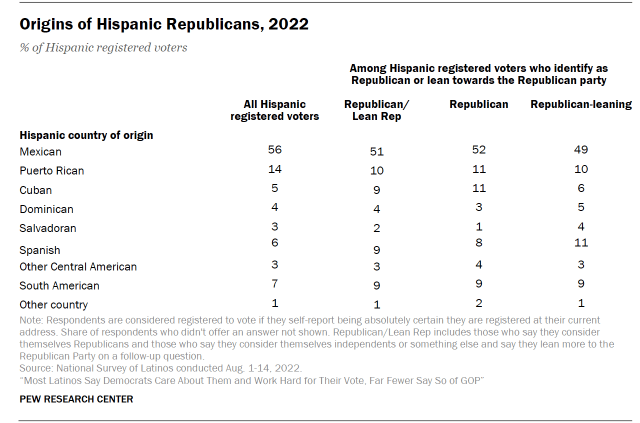Hispanic voters shifted notably toward the Republican Party in 2020, and the Nov. 8 midterms will provide new evidence of the extent to which that shift has started to take root.
Regardless of the results, however, Hispanics in the United States have expressed complex and nuanced political attitudes and fluctuating levels of support for the parties over the past 40 years. And their policy views do not always align with those of non-Latinos in the same party, according to recent Pew Research Center surveys.
Related: 10 facts about Black Republicans
We conducted this study to understand the nuances of Hispanic political identity and how it compares with those who are not Hispanic. Data on the views of political issues relies largely on a Pew Research Center survey conducted in August 2022. For this analysis, the terms Hispanic and Latino are used interchangeably and refer to those who identify themselves in this way.
We surveyed 7,647 U.S. adults, including 3,029 Hispanics, from Aug. 1-14, 2022. This includes 1,407 Hispanic adults on Pew Research Center’s American Trends Panel (ATP) and 1,622 Hispanic adults on Ipsos’ KnowledgePanel. Respondents on both panels are recruited through national, random sampling of residential addresses. (See our “Methods 101” explainer on random sampling for more details.) Read more about the ATP’s methodology. Here are the questions used for our survey of Hispanic adults, along with responses, and its methodology.
Some data also comes from surveys conducted June 27-July 4, 2022, and Oct. 10-16, 2022.
The political typology in this analysis classifies Hispanics and non-Hispanics into nine distinct groups based on their political values and attitudes. The data is from a 2021 Center report on all U.S. adults.
In particular, Latino Republicans and Republican-leaning independents differ substantially from other Republicans on guns and immigration, highlighting the relatively weak ties that Hispanic Republicans have to the GOP.
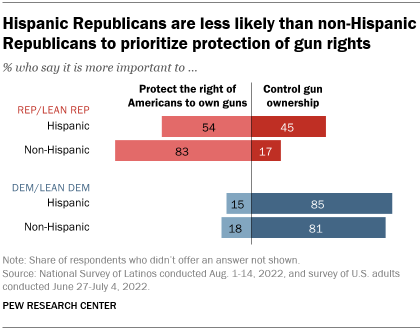
About half of Hispanic Republicans and Republican-leaning independents (54%) say it is more important to protect the right to own guns than it is to control gun ownership, while a far higher share of non-Hispanic Republicans (83%) say the same. Among Democrats, by contrast, Hispanics and non-Hispanics hold similar views on this question, with overwhelming majorities saying controlling gun ownership is more important.
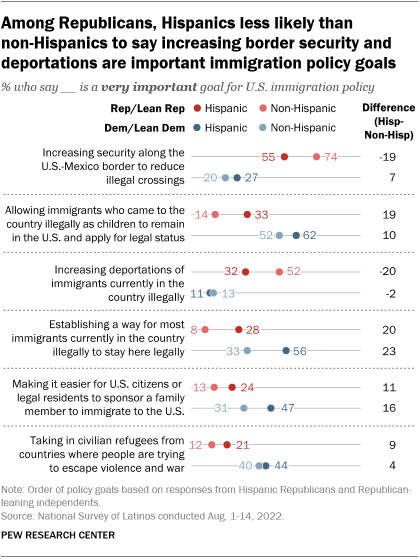
Similarly, Hispanic Republicans are less likely than non-Hispanic Republicans to say it is a very important immigration policy goal to increase security at the U.S.-Mexico border (55% vs. 74%) and increase deportations of immigrants living in the United States illegally (32% vs. 52%), according to an August Pew Research Center survey. Meanwhile, larger shares of Hispanic Republicans than non-Hispanic Republicans say it is a very important goal to allow immigrants who came illegally to the U.S. as children to apply for legal status (33% vs. 14%) and to establish a way for most immigrants currently in the country illegally to stay legally (28% vs. 8%).
Among Democrats, Hispanics and non-Hispanics have similar immigration policy priorities, though some differences still exist. More than half of Hispanic Democrats (56%) say it is a very important goal for U.S. immigration policy to establish a pathway to legal status for those in the country illegally, while a lower share of non-Hispanic Democrats (33%) say the same. Hispanic Democrats are also more likely than non-Hispanic Democrats to say it is very important to make it easier for U.S. citizens or legal residents to sponsor family members to immigrate to the U.S. (47% vs. 31%).
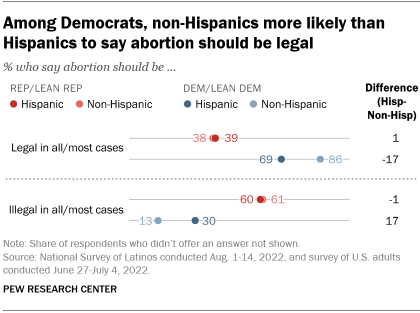
On other issues, differences between Hispanics and non-Hispanics emerge among Democrats – but not among Republicans. For example, about two-thirds of Hispanic Democrats (69%) say abortion should be legal in all or most cases, while a higher share of non-Hispanic Democrats (86%) say the same. Among Republicans, similar shares of Hispanics (39%) and non-Hispanics (38%) say abortion should be legal in all or most cases.
Hispanic voters’ views of candidates, top issues and political leaders in 2022
Overall, Latino registered voters identify with or lean toward the Democratic Party over the Republican Party by a nearly two-to-one margin (64% vs. 33%), with Latino party identification shifting little over the past few years.
For this month’s elections, a higher share of Hispanic registered voters say they prefer the Democratic candidate over the Republican candidate in their local U.S. House race, but a substantial share (27%) say they are undecided or plan to vote for another candidate, according to a Pew Research Center survey conducted in early October.
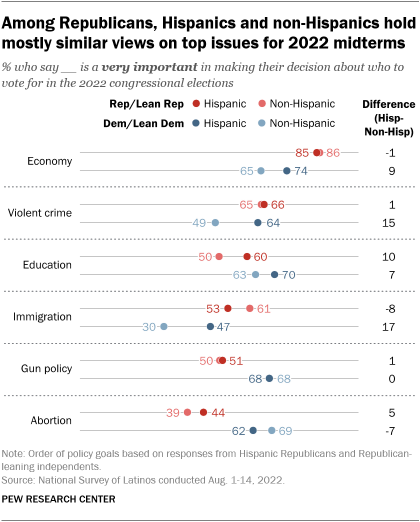
When it comes to issues, about equal shares of Hispanic and non-Hispanic Republicans (85% and 86%, respectively) say the economy is very important in making a decision about who to vote for, making it the top issue for both groups, according to the August survey.
Hispanic Republicans (60%) are more likely than non-Hispanic Republicans (50%) to say education is very important to their vote, while generally similar shares say the same about violent crime, abortion and gun policy.
Among Democrats, the largest difference comes on immigration, with 47% of Hispanics and 30% of non-Hispanics saying the issue is very important to their vote. A higher share of Hispanic than non-Hispanic Democrats say violent crime is very important to their vote (64% vs. 49%), while non-Hispanics are more likely than Hispanics to say abortion is very important (69% vs. 62%).
Hispanic and non-Hispanic partisans hold similar views of President Joe Biden, according to the October survey. Among Republicans, the vast majority of Hispanics (80%) and non-Hispanics (95%) alike disapprove of the job Biden is doing as president. Meanwhile, among Democrats, a majority of both Hispanics (64%) and non-Hispanics (73%) approve.
When it comes to former President Donald Trump, Hispanic partisans again hold views that are similar to those of their fellow non-Hispanic partisans. According to the August survey, a majority of Hispanic Republicans (58%) and non-Hispanic Republicans (64%) say Trump should remain a national political figure. Meanwhile, nearly all Hispanic (90%) and non-Hispanic Democrats (94%) say Trump should not remain a national political figure.
A closer look at groups within the Hispanic Republican coalition
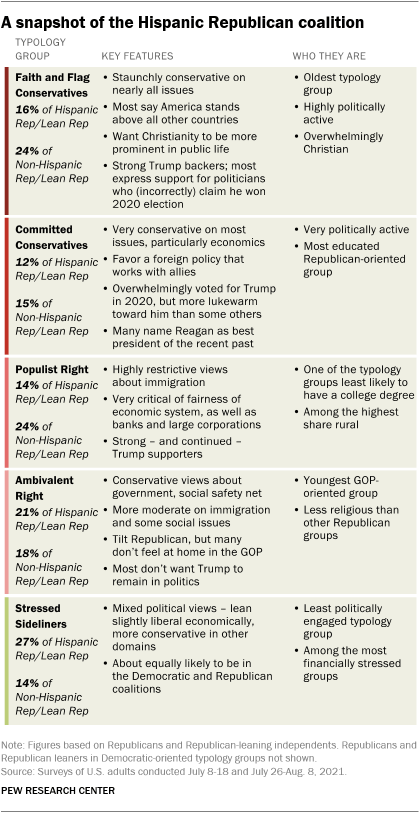
Despite deep partisan divides in U.S. politics, Pew Research Center’s 2021 political typology study found that Republicans are diverse in their political views. This is especially true among Hispanic Republicans.
Among Hispanics who identify with or lean toward the GOP, 16% are “Faith and Flag Conservatives” in the political typology, the most deeply conservative group across the board. This group makes up a larger share of non-Hispanic Republicans (24%).
By comparison, 12% of Hispanic Republicans are “Committed Conservatives,” a group whose members hold pro-business views and advocate for limited government but take less restrictive views on immigration and are less isolationist on foreign policy. This group makes up 15% of non-Hispanic Republicans.
Another 14% of Hispanic Republicans are “Populist Right,” a conservative group with hardline immigration views whose members tend to see the economic system as favoring powerful interests. A far greater share of non-Hispanic Republicans (24%) belong to the Populist Right.
About two-in-ten Hispanic Republicans (21%) are “Ambivalent Right.” This is the only Republican-oriented group where more characterize their views as politically moderate than conservative. Republicans in this group hold conservative views about government but tend to be more moderate on immigration and some social issues.
Meanwhile, the group with the highest share of Hispanic Republicans are “Stressed Sideliners,” a group that – as a whole – doesn’t have a clear partisan leaning, according to the typology. About a quarter of Hispanic Republicans (27%) belong to this group – as do 15% of Hispanic Democrats. Stressed Sideliners tilt somewhat conservative on some social issues and more liberal on economic issues. What distinguishes Stressed Sideliners is that they are the least politically engaged of any typology group, and among the most financially stressed.
About one-in-ten Hispanic Republicans (9%) belong to a Democratic-oriented typology group. These Hispanic Republicans lean toward the GOP but hold views that are more aligned with people who tend to say they are Democrats.
Overall, about half of Hispanic Republicans (57%) belong to the two groups with weakest ties to the Republican Party – Ambivalent Right and Stressed Sideliners – or Democratic-oriented groups. Another 43% of Hispanic Republicans belong to the three solidly conservative groups – Faith and Flag Conservatives, Committed Conservatives and Populist Right.
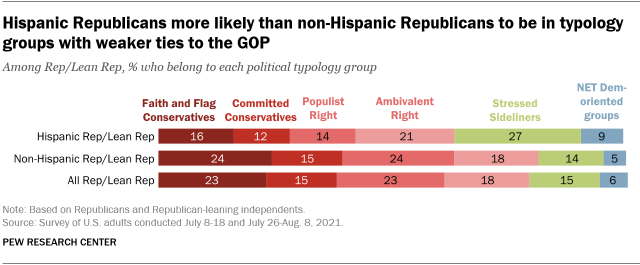
A closer look at groups within the Hispanic Democratic coalition

The Democratic coalition also contains groups with a variety of political views, and Hispanics are especially likely to belong to groups with weaker ties to the party – though this dynamic is less pronounced than among Hispanic Republicans.
About 7% of Hispanic Democrats and Democratic-leaning independents fall into the typology’s “Progressive Left,” which is the most liberal Democratic group across the board. Another 19% are “Establishment Liberals,” a group that is politically engaged and, while also liberal, tends to favor more measured policy solutions. Both of these groups make up larger shares of non-Hispanic Democrats than Hispanic Democrats.
The group with the highest share of Hispanic Democrats (28%) is “Democratic Mainstays,” whose members are especially likely to identify as moderate. They tend to hold liberal views on economic issues and somewhat more conservative views on immigration, at least in comparison to the liberal groups. About half of Hispanic Democrats (54%) belong to these three solidly Democratic groups.
About one-in-five Hispanic Democrats (19%) are “Outsider Left,” which is by far the youngest group and among the least politically active among all Americans. Members of this group are very liberal on climate, race and immigration issues. They are more likely to identify as independents than partisans, and the vast majority say there are usually no political candidates that represent their views well.
Another 15% of Hispanic Democrats are “Stressed Sideliners,” a group with no clear partisan tilt whose members are financially stressed and relatively unengaged with politics. Finally, 12% of Hispanic Democrats belong to a Republican-oriented group. These are Hispanics who identify as Democrats or lean to the Democratic Party but hold views more aligned with groups whose members tend to be Republicans.
Overall, nearly half of Hispanic Democrats (46%) belong to two groups with relatively weak ties to the Democratic Party – Outsider Left and Stressed Sideliners – or a Republican-oriented group.




